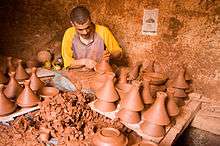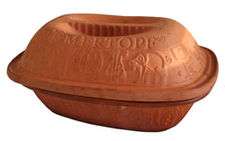Clay pot cooking
Clay pot cooking is a process of cooking food in a pot made of unglazed or glazed pottery.
Cooking techniques

Different cultures have different techniques of cooking food in pottery. Some design pots that are fully finished by burnishing and therefore don’t require the pot to be soaked each time before use. Some are unfinished and work well when soaked for about 30–45 minutes in water, each time before use. The design and shape of the pot have been slightly modified from one culture to another to suit their style of cooking. Seasoning is an essential part of cooking in clay. Seasoning is done by making a broth with flour (rice or wheat) and vegetable cooking oil. These ingredients are mixed to the water in the pot and brought to a boil.
Consider a pot to be fully seasoned only after using it a couple of times cooking wet dishes like soups and stews etc. It’s best to gauge cooking time for a recipe after using the pot for a few times – during first few uses it takes longer. A fully seasoned pot is very versatile and durable. Increase heat gradually (within a span of 5 minutes) and only go up to medium heat. All foods fully get cooked at this temperature. The temperature may go to between 450 °F and 500 °F when cooking in the oven, but again increase heat gradually and start by placing the pot in a cold oven or just slightly pre-heated (100-200 °F)
The food inside the pot loses little to no moisture because it is surrounded by steam, creating a tender, flavorful dish. The evaporation of the water prevents burning so long as the pot is not allowed to heat until it is completely dry. Because no oil needs to be added with this cooking technique, food cooked in clay many times is lower in fat compared with food prepared by other utensils. Pots also seal all the nutrients inside the pot by locking steam in. The unglazed pottery utensil made from clay is inert or non-reactive and does not leach into food.
Earthenware cooking pots are made from special clay that can withstand heat in an oven or on the stovetop.
In Asian cuisines
Subcontinent
In different parts of the subcontinent different shapes of pottery utensils have been used. In the southern states of Andhra Pradesh, Kerala, Tamil Nadu and Telangana in India, the traditional pot used for cooking is called a chatti. There are many different types of pots used in the different cultures of North India, Pakistan, Bangladesh.
India
In northern states like Panjab, Uttar Pradesh, Haryana, Rajasthan, the cooking pots are called handi. In the past, Indian chefs could cook many dishes simultaneously, by placing one handi above another while cooking.
Sri Lanka
People in Sri Lanka use a pot to make many different and special foods especially one called pahi (“little jackfruit”) fish curry, called abul thiyal and some meat and specially rice and some chutney called accharu. Usually pots are used for making freshwater fish called Lula, Hunga, Magura and Kawaiya. For more than 2,000 years, Sri Lankans used pots and now both urban and village people use pots.
China
In Chinese, the pot used for such cooking is generally known as Chinese: 砂鍋; pinyin: shā guo; Cantonese Yale: sā wō or Chinese: 煲仔; Cantonese Yale: bōu jái, a Cantonese word for “little pot”. Pottery dishes are sometimes labeled as “hot pot” or “hotpot” dishes on the menus of Chinese restaurants in English-speaking areas of the world., but they should not be confused with hot pot dishes that are served in a large metal bowl and cooked at the table. In Taiwan, the chicken dish sanbeiji is prepared in a clay pot.
Japan
In Japan, the pot used for cooking is called a donabe, although it is not submerged in water.
Vietnam
In Vietnam, the stew-like dish called kho is cooked in a pot. The pot is most often called nồi đất in Vietnamese, although, depending on its size and use, it may also be called nồi kho cá, nồi kho thịt, nồi kho tiêu, or nồi kho tộ.
Philippines
In the Philippines, the traditional pot used for cooking is the palayok.
Indonesia
In Indonesia, the traditional pot used for cooking is called kuali.
In African cuisines
Ethiopia
In ancient Ethiopia, all cooking was done with hand-made pots made for different types of food. And is still a method of cooking some special recipes whose taste can’t be replicated in metal pots.

Morocco
The tajine is a North African, two-piece pot used in Moroccan cuisine. The bottom part is a broad, shallow bowl, while the top is tall and conical, or sometimes domed. The tall lid acts to condense rising steam and allow the moisture to roll back down into the dish.[1] The tajine lends its name to the dish made in it, which in Morocco is a meat stew.
In European cuisines
Germany

In Germany, the pottery roaster used to cook with is called a Römertopf (“Roman pot”). Since its introduction in 1967, it has influenced cooking traditions in Germany and neighbouring countries. The pot is mainly used to cook meat, like pork roast, chicken or stew, in an oven.
Spain
In Spanish cooking a ceramic roaster known as "olla de barro" is used.
Italy
The pignata is a vase shaped pot used for cooking beside a fireplace or in a wood fired oven.[2][3]
In South American cuisines
Pottery are used in different South American and Mexican recipes.
In the United States
While Native American civilizations have always cooked in pottery, a lot changed with the arrival of the Europeans who were reusing their metals by making them cooking pots. Cooking in pottery is making a come back in the USA among health and environmentally conscious cooks.
See also
References
- ↑ Wolfert, Paula (2009). Mediterranean Clay Pot Cooking: Traditional and Modern Recipes to Savor and Share. Hoboken, N.J.: John Wiley & Sons. ISBN 9780764576331.
- ↑ Barbara Goldfield (18 October 2011). "Pizza, Pane & Pignata". ItalianNotebook. Retrieved 12 August 2016.
- ↑ Alessia (17 November 2013). "La "Pignata"". Il Sud che non ti aspetti (in Italian). Retrieved 12 August 2016.
External links
| Wikibooks Cookbook has a recipe/module on |
- Clay Pot Cooking Overview How to cure a clay pot before going with clay pot recipes
- Romertopf - Nature's Oven The Romertopf Originated in Germany and Combines Specific Porous Clays in a Secret Ratio
- Clay Bakers Images of Romertopf Clay Bakers
- Claypot Chicken With Bitter Gourd Traditional Chinese recipe
- http://homepages.uel.ac.uk/d.p.humber/hethiop.htm Ethiopian Cooking